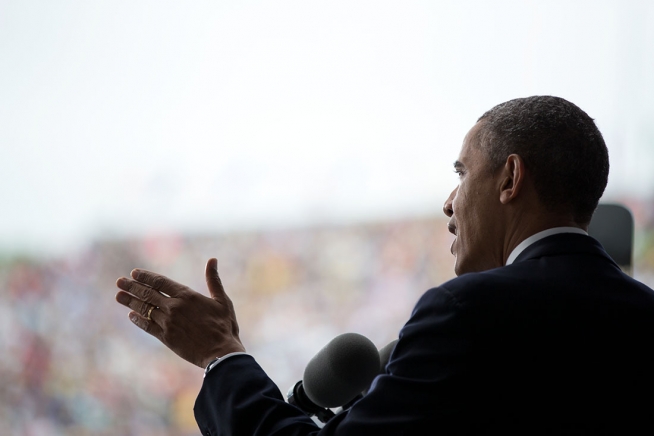 President Obama’s explanation of his foreign policy has come and gone, but he has won few converts. True, he tells a credible story about continuing US leadership, exceptionalism, and the intermeshing of unilateral and multilateral approaches. But that’s largely a story about mechanics—about how the US acts in the world. And it’s a story told at a time when allies and partners aren’t just anxious about the how, they’re also worried about the when, where, and why.
President Obama’s explanation of his foreign policy has come and gone, but he has won few converts. True, he tells a credible story about continuing US leadership, exceptionalism, and the intermeshing of unilateral and multilateral approaches. But that’s largely a story about mechanics—about how the US acts in the world. And it’s a story told at a time when allies and partners aren’t just anxious about the how, they’re also worried about the when, where, and why.
Obama’s presentation shows he’s someone who fits naturally in the Joseph Nye-John Ikenberry school of international relations. No surprises there. He doesn’t rush to use of hard power, he accepts unilateral use of force is justified in defence of core interests, and he’s interested in using multilateral institutions and regimes as a means of promoting and extending US leadership.
He didn’t just talk about his academic settings, though, but his emotional ones as well, presenting himself as a figure ‘haunted’ by the deaths and injuries of US soldiers in wars. The Obama of 2014 is a less assured figure than the Obama of 2008, and it comes across even in the style of his speeches: the oratory is less sweeping, the practical limitations on grand designs are more pronounced. (As an oratorical exercise, Obama’s commencement speech at West Point can’t hold a candle to this one.)
The overall effect is that Obama’s foreign policy is less a clarion call and more a wavering trumpet. Allies and partners will be scratching their heads attempting to figure out what US strategic policy will look like for the next 30 months. Ok, there isn’t an existential threat to the US; yes, NATO and the UN are worthy multilateral organisations, albeit somewhat dated; true, Russia isn’t now the threat it was in Cold War days; and agreed, most Ukrainians still want democracy and a market economy. Moreover, the US economic picture looks better in 2014 than it did in 2009.
But Russia doesn’t need to be the threat it was in Cold War days to make Western and Central Europeans nervous. It doesn’t need an ideology of global domination or a Warsaw Pact to coerce its neighbours. On the other hand, China’s a much stronger power now than it was in Cold War days—and it’s challenging the existing security order in Asia, not embracing it. The mood of triumphalism in Beijing isn’t a manifestation of Chinese satisfaction that they’re finally going to be admitted to the current security order. On both sides of Eurasia, authoritarian great powers are pressing their claims.
In short, there’s an edginess in the current international strategic environment that Obama’s speech will have done little to quell. Clearly, the US president can’t be responsible for every sparrow that falls. But institutions and regimes are built by victors—that’s why Germany and Japan weren’t permanent members of the UN Security Council when it was first designed.
For Australian policy-makers, there’s a big question and a set of smaller ones. The big question is ‘Why has Obama done this?’ Does the speech signal a new coherency in US foreign and defence policy? Or is it the defensive speech of a US president feeling the pressure on that front? So far, the second view looks more accurate than the first, though it’s always interesting to see how presidents stitch together the disparate parts of their strategic framework. Smaller questions swirl around the place of the ‘rebalance’ in US strategic policy (not addressed at all in the speech), and the relative weighting of the different US alliances. The different structures of the US-European and US-Asian alliances seem to matter in Washington more than we might have thought. NATO, for example, is seen as a key component of the global multilateral structure, in a way that the hub-and-spokes arrangements of Asia aren’t.
Perhaps just as important for us is the question of how the speech will be read elsewhere, including within the US. So far, the response has been muted. The Editorial Board of the Washington Post didn’t seem to like it much, and reactions elsewhere among the US commentariat were comparatively negative. Chinese and Russian reactions are more opaque, but it’s likely Beijing and Moscow both see the speech as a president trying to answer his domestic critics, and not aimed at them. Other countries may have a similar view, and count the speech as merely one more straw in the wind of US foreign policy. In a few, perhaps, forensic analysis may lead to a novel interpretation or two. But the key message of the speech is there for all to see; Obama is explaining his policy, not rewriting it—and that suggests he doesn’t intend to change course in the last couple of years of his presidency.
Rod Lyon is a fellow at ASPI and executive editor of The Strategist. Image courtesy of the White House.

